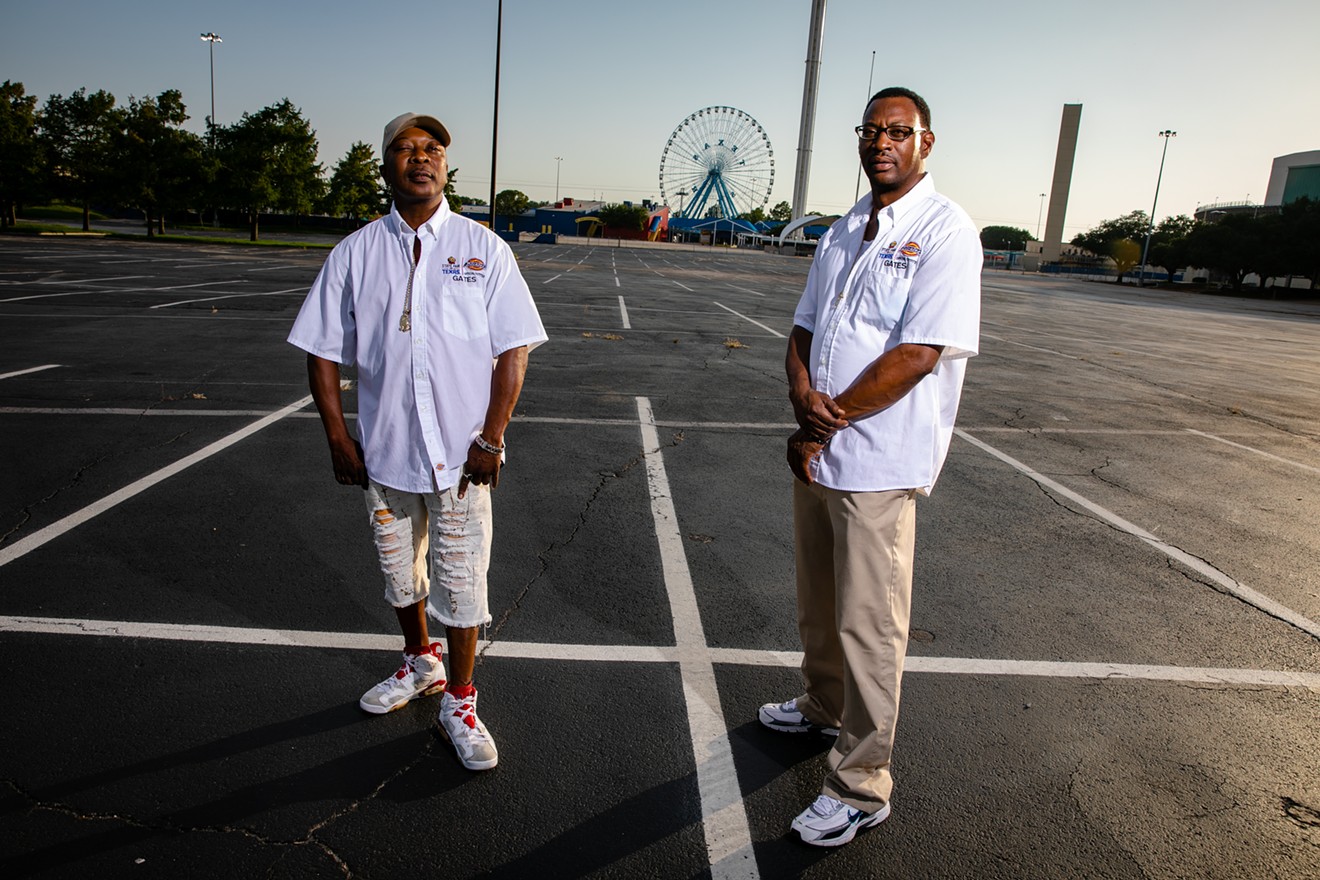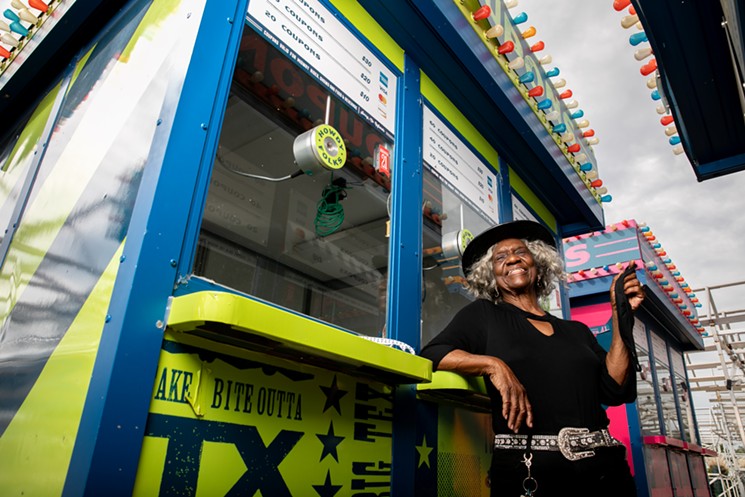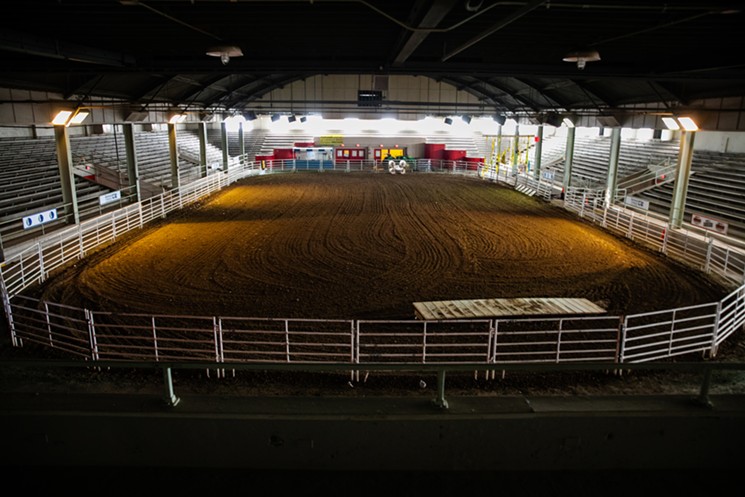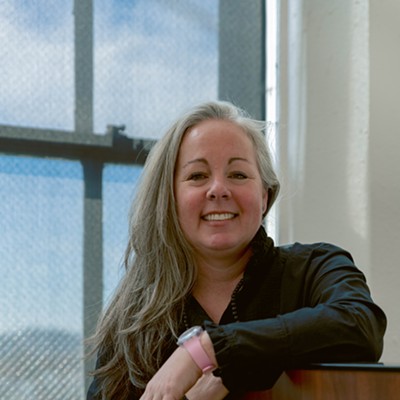Eakles was one of the final conduits between mundane life and fried-everything-on-a-stick and a guaranteed good time. He loves the work.
“The kids are always so excited because they’re about to go experience so much joy and ride the rides,” Eakles says. “It’s fun. I really enjoy that. I also get to meet people from all over the world. I’ve met people from China, France, Australia and all parts of the United States.”
He even got to know the regulars over the years.
“The vendors park in the same area and come back every year. A lot of them aren’t from Texas. They travel around from state to state, but you get to know them and recognize their kids and see their kids grow up. It’s a great experience,” Eakles says.
At first glance, the State Fair of Texas is pure, gluttonous fun: corny dogs, wild culinary creations, the 212-foot tall Ferris wheel and the sounds of the midway. The excitement and anticipation for kids, adults and even those who work to pull it all off are understandable. Since it first began in 1886, the fair has rooted itself in Texas culture and history.
Those are the obvious reasons we love the fair and why its cancellation this year was a blow to Dallas. But there are other, more mundane reasons — 400 million of them.
That’s how many dollars the State Fair of Texas estimates it pumps into the North Texas economy annually. As a nonprofit, the organization directs funds back into the community that surrounds Fair Park.
“I don’t know what we’re going to do. This was it for us. When I heard the news, I just broke down and cried.” – fair worker Gladys Richardson
tweet this
In January 2020, the State Fair of Texas reported that more than 67 organizations in the southern sector of Dallas received $483,000 in grants throughout 2019. The money went toward groups that strive to build strong communities in the South Dallas and Fair Park neighborhoods.
This April, the fair awarded more than $1.24 million in new college scholarships to graduating seniors. Eighty-two of those, called The Pete Schenkel Scholarships, were given specifically to seniors from the six Dallas ISD high schools that are nearest to Fair Park. Another 120 Youth Livestock Scholarships were doled out, and the 71st Annual Big Tex Youth Livestock Auction raised $1.5 million, a record-setting year.
Since its establishment in 1992, The Big Texas Scholarship Program has awarded more than 2,700 students over $13.7 million.
Then there are the jobs. For 24 consecutive days, the State Fair of Texas provides 2,500 seasonal positions with another 4,500 that are hired through vendors and companies that work within the fair. Of those 7,000 jobs, 80% are filled by Dallas residents.
As a nonprofit and an employer, the fair has a substantial impact on the economy, particularly in its immediate neighborhoods, among the poorest in the city. Its cancellation this year because of the COVID-19 pandemic, the first time the fair has been canceled since World War II, will have an equally substantial effect on those neighborhoods.
“That’s all I did all day, was count money,” says 76-year-old Gladys Richardson of Dallas. She’s worked at the fair for 30 years, the past 15 selling coupons in a booth. She was devastated when the news came out last week that the 2020 season was canceled. She’s raising her 13-year-old grandson while his mother is in prison and relies upon the money she earns from the fair.
“I don’t know what we’re going to do,” Richardson says. “This was it for us. When I heard the news, I just broke down and cried.”
For her, the fair was not just a source of income. It was about being a part of a community.
“I looked forward to it every year, and the work is not strenuous,” Richardson says. “I don’t do anything but sit down and count money. I’m not bothered by the elements. If it’s hot outside, I got the air conditioning. If it’s cold, I got heat. So, I don’t have to worry about that.”
Her voice picks up a beat when she talks about what it’s like to be an employee of the fair.
“Everyone treated us wonderfully. Wonderfully,” she repeats for emphasis. “It’s something you really looked forward to. You don’t see any prejudice out there. If there is, they keep it to themselves because everybody is friends. Black, white, Spanish, you work with every race of people you can imagine, and you don’t have to worry about it. Everybody is everybody. We’re just like sisters and brothers. There are no color barriers. They don’t care about what color you are.”
Lucky Clark, 55, a polite man of very few words, has worked as a parking lot attendant, directing traffic and helping pedestrians for the past seven years. He, along with Eakles and Richardson, is a member of Cornerstone Baptist Church.
“Working for that extra income literally carries them through the rest of the year, particularly leading into Christmas time. They really relied on this income.” – Pastor Chris Simmons, Cornerstone Baptist Church
tweet this
Clark says he especially enjoyed the connection he felt with people of his culture.
“And financially, it helped me a lot,” Clark says. “I kind of depended on it since I have four kids.
“I’ve been looking forward to it because I worked with a lot of good people and it kept me focused on things. I met a lot of interesting people there. I just enjoyed it a lot. It kind of made me sad when I heard it was canceled.”
Armando Cantu is the executive director of CARDBoard Project (CBP), a nonprofit organization that bridges the digital gap for under-resourced communities. Through job fairs, CBP provides online access and guidance for clients to create a digital identity while teaching them how to search and apply for jobs. Cantu says they often set up job fairs at the Martin Luther King Library, Cornerstone Kitchen and The Stewpot, a community kitchen.
Loss of the State Fair of Texas is a big hit for the community he serves.
“In 2019, CBP assisted over 700 clients with applying for jobs at the fair, many of whom live in a digital desert and lack electronic devices,” Cantu says. He also points out that about 25% of the people he works with have a disability, making that seasonal job even more important to their supplemental income.
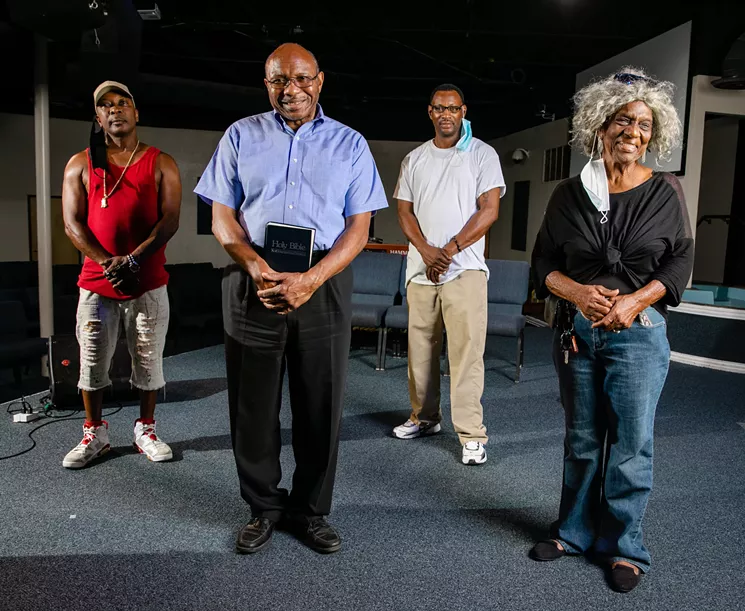
From left to right: Lucky Clark, Pastor Chris Simmons, Perry Eakles, Gladys Richardson at Cornerstone Baptist Church
Nathan Hunsinger
“We’ve had members who have really depended on that income every year, and not for several years, I mean 10 and 20 years,” Simmons says. “Working for that extra income literally carries them through the rest of the year, particularly leading into Christmas time. They really relied on this income.”
This is one of many hurdles that has hit his inner-city community this year, most the direct result of the COVID-19 pandemic.
According to the Texas Workforce Commission, congressional District 30, which encompasses Fair Park and its surrounding communities, had the third-most unemployment insurance claims in the state between May 27 and June 27.
The median household income for the neighborhoods immediately surrounding the park was $26,811 in 2016, according to the website city-data.com. In all of Dallas, the median was $47,243.
The fair’s starting wage is $11.71 per hour, and it varies with years of experience. If an employee works all 24 days, eight hours a day, their gross pay would be $2,248.
“It’s been one hit, one roadblock after another, which underscores the great divide between the haves and the have-nots,” Simmons says.
Food banks and community shelters serving the most vulnerable have had to restructure not only the services they provide, but also how they provide them. Strains on the system have largely been met with swift adaptation. But, in the end, as restaurants, professional sports seasons and conventions have been postponed or canceled, low-wage hourly jobs have been lost, exacerbating problems in the historically high-poverty area.
Hospitality and recreation services, a source of many jobs in the downtown area, have borne the brunt of the economic storm COVID-19 has caused. The U.S. Bureau of Labor Statistics reported that from May 2019 to May 2020, the leisure and hospitality industry was down 29.3% in the Dallas-Fort Worth-Arlington area. No other industry is even in double digits in terms of overall percentage drop.
That creates an even greater need for seasonal hourly work.
Eakles says he started working at Gate 5 because people told him he didn’t smile enough.
“I know one thing about the fair, everyone smiles a lot,” Eakles says. “That’s one of the main attributes, is the greeters always smile. They’re who people first see when they come in, so everyone always has a smile on their face. So, that’s why I initially took the job because my friends said I didn’t smile enough.”
Losing that source of income is disappointing to Eakles, but he recently picked up a part-time job at Cornerstone Baptist Church, which helps.
“My momma always told me to put up for a rainy day. Well, this is a rainy day,” Eakles says, matter of factly. “I’m just trying to maintain, and you know you can’t put all your eggs in one basket. You have to look forward. Things like this are going to happen. You need to be prepared for it.”
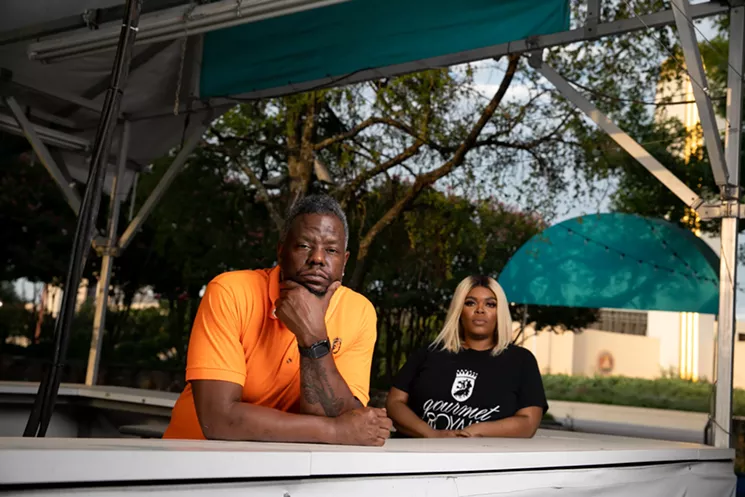
Greg Parish and his niece Whitney Cheatham have won past fair food competitions with dishes like bourbon bacon brittle, but not this year.
Nathan Hunsinger
Over the years, though, as many do, the Parish family grew more creative with their menu. Their first fried food was a stuffed jalapeño pepper.
“From there we continued to grow,” Parish says. “He expanded to a second location at the fair and started selling chicken and waffles in 1996.”
In 2010, with his father's health declining, Parish and his sister Tracy Tolbert stepped in to help and took the opportunity to push the boundaries even more.
“We updated the menu and made some changes,” Parish says. “The next year we decided to participate in the contests. We made fried red velvet cake and chicken and waffles on a stick.”
Their repertoire expanded quickly: fried spaghetti and meatballs, fried shrimp and grits. As they got better, so did the competition around them. Abel Gonzalez Jr., the “Fried Jesus” who was a five-time winner of the Big Tex Choice Award for fair food, was pushing the envelope for everyone. Parish and his family, however, started placing in the contests, doing a little better each year.
In 2017, Parish’s sister passed away so his niece Whitney Cheatham stepped in to help. In 2018, they sold bourbon bacon brittle.
“It was a super smash hit,” Parish says. “It was pandemonium every day. Last year, in 2019, we had deep-fried Southern fried chicken fettuccine balls and we placed in the top 10.”
It ended up being their best year ever. “Like, record-breaking,” Parish says.
Parish has since enrolled in culinary school and purchased a commercial kitchen where he operates his food business, Gourmet Royale, near Fair Park to prepare for this season. He’s determined to win first place.
All of that has been set aside. He says like other entrepreneurs since the pandemic hit, he has had to pivot his business. The real moment for him was when the NBA postponed their season.
“I just had to have that tough talk with myself,” Parish says. “When the virus hit, we just had to go to takeout and delivery.”
In September and October, Parish plans on introducing a fair-inspired menu, including their hot-ticket items.
He realizes how hard this is on so many people.
“It was an emotional day,” Parish says of when it was announced that the fair was canceled. He says that many people depend on that income to carry them through the entire year, and not to have that, and given the financial situation with the pandemic, not everyone is as fortunate as he has been.
“My heart goes out to the employees and workers. That was not a good day,” Parish says.
“My momma always told me to put up for a rainy day. Well, this is a rainy day.” – fair worker Perry Eakles
tweet this
“But, it’s one of those necessary evils. I’d rather be disappointed now rather than go forward and put in the time, energy and money and then either not be successful or end up catching the virus, or worse, causing someone else to catch the virus.”
Fair Park and the surrounding neighborhood are represented by City Council member Adam Bazaldua. He says his office received phone calls shortly after the fair was canceled. Constituents were worried about the huge financial hit their community will take this year.
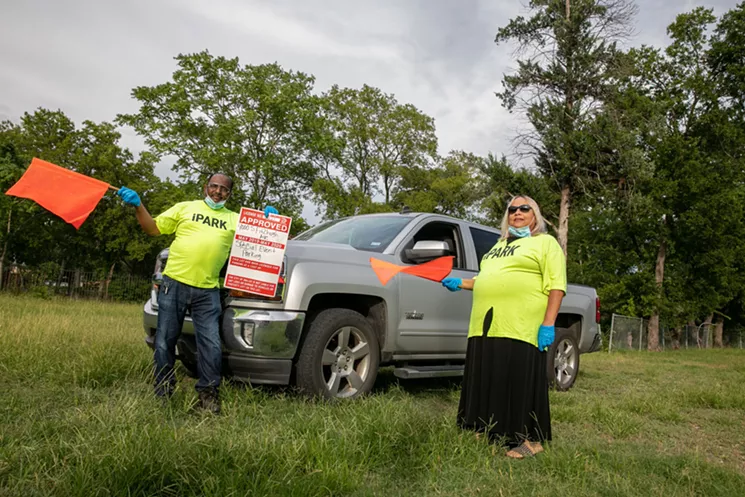
Mike Davis and his wife, Gaytha, in their lot across from Fair Park that they have used for fundraising in past fair years.
Nathan Hunsinger
Each May, they purchase a permit from the city’s transportation department that allows them to sell parking spaces for events at Fair Park. Other landowners in the area do the same thing; they’ve created a group called the Fair Park Permit Holders Coalition.
“There tends to be a lot of people from the area involved,” Gaytha says. “Often this is the only job they have, their only income for the year. Sadly, we’ve been receiving calls from people worried about what’s going to happen this year.”
She recalls an elderly woman who helps them during the fair season who can neither read nor write. They also saw the lines of cars in Fair Park when the North Texas Food Bank mobile pantry passed out boxes of food to nearly 1,500 families over just a few hours in May.
They’re looking for other ways to try to help their neighborhood. Mike needs the eaves of his house painted soon and will hire someone locally who typically works during the fair.
“Now, I’m not feeling sorry for him,” he says. “He’ll have to paint. We just feel we’ve been very blessed to have been able to work and have been able to retire. But, we see what’s going on, and it’s not good.”
Mr. Davis spoke to Bazaldua last week and said they feel like he’s listening.
“We’re going to have to get creative to try to create other opportunities for the community, which will pale in comparison to the fair. There are ways to supplement things during these hard times, but on a smaller scale,” Bazaldua says.
That includes the football games regularly held at the Cotton Bowl. The Texas-Oklahoma and Prairie View A&M-Grambling State matchups will provide a little opportunity, assuming they take place. Bazaldua says those games are still on the table, but their futures are as unpredictable as everything else amid the pandemic.
Eakles, Clark and Robinson would love to take their usual spots to welcome people to the State Fair of Texas, all smiles. Parish will miss making more memories in the midway, or perhaps winning first place for another one of his fried food creations.
It’s a bittersweet time. The reasons members of the community can’t afford not to work are the same reasons they can’t afford to get sick.
“There are people calling us asking us when we’re going back to work,” Gaytha Davis says. “It’s cryin’ time.”

